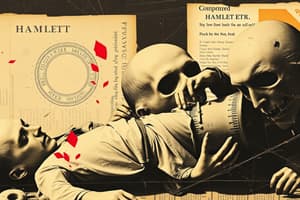Podcast
Questions and Answers
How does Hamlet's soliloquy, 'To be, or not to be,' relate to the theme of death?
How does Hamlet's soliloquy, 'To be, or not to be,' relate to the theme of death?
- It expresses a desire for revenge.
- It discusses the pleasures of life.
- It reflects existential contemplation of life and death. (correct)
- It celebrates death as a release.
What symbolic imagery in Hamlet represents decay and corruption?
What symbolic imagery in Hamlet represents decay and corruption?
- Ophelia's flowers
- Yorick’s skull (correct)
- The disintegration of Denmark's political structure
- The ghost of King Hamlet
In what way is mortality linked to the state of Denmark in Hamlet?
In what way is mortality linked to the state of Denmark in Hamlet?
- It symbolizes the rotting and corruption under Claudius's rule. (correct)
- It shows the prosperity of the kingdom.
- It is only relevant to Hamlet's personal struggles.
- It is seen as a mere backdrop to the play's action.
What role does the graveyard scene play in relation to death in Hamlet?
What role does the graveyard scene play in relation to death in Hamlet?
What aspect of Hamlet's character is primarily influenced by his preoccupation with death?
What aspect of Hamlet's character is primarily influenced by his preoccupation with death?
How does the character of Hamlet primarily perceive death throughout the play?
How does the character of Hamlet primarily perceive death throughout the play?
Which of the following best describes the significance of Yorick's skull in the play?
Which of the following best describes the significance of Yorick's skull in the play?
What overarching effect does Hamlet’s preoccupation with death have on his actions and the events in Denmark?
What overarching effect does Hamlet’s preoccupation with death have on his actions and the events in Denmark?
In what way does Claudius's rule metaphorically represent decay in Hamlet?
In what way does Claudius's rule metaphorically represent decay in Hamlet?
Which aspect of Hamlet's soliloquy, 'To be, or not to be,' best reflects his views on mortality?
Which aspect of Hamlet's soliloquy, 'To be, or not to be,' best reflects his views on mortality?




